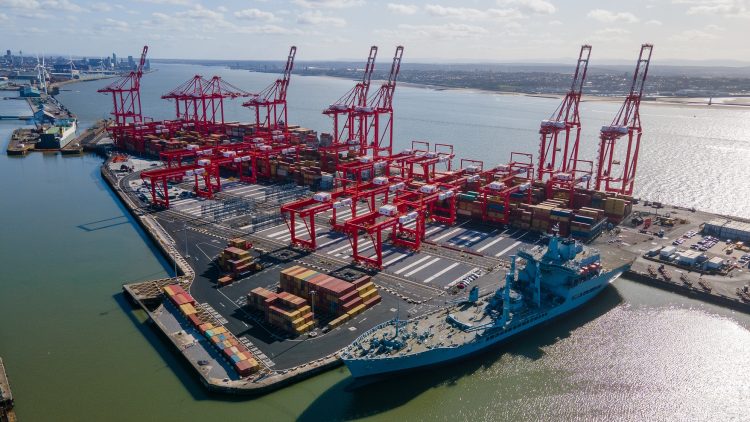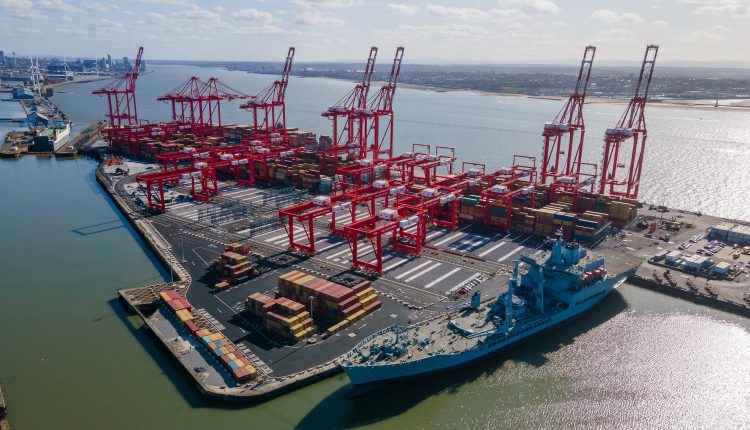Peel Ports reports revenues close to £700m
Port of Liverpool operator Peel Ports Group reports annual revenues just shy of £700m – up 12.7% on a year ago and despite the war in Ukraine hitting freight tonnage. Tony McDonough reports

Port of Liverpool owner Peel Ports Group is reporting a 12.7% rise in annual revenues to £696.3m despite disruption from the war in Ukraine and industrial action in Liverpool.
Peel Ports has posted its results for the 12 months to March 31, 2023 on Companies House. They also show a huge rise in pre-tax profits from £66.6m in the previous year to £397.3m.
The accounts state the figure is boosted by a “non-cash net income of £256.5m relating to the change in the fair value of derivative financial instruments” as well as gains from the “retranslation of foreign currency loans”.
LBN has contacted Peel Ports Group to ask for a simpler explanation of the figure. It replied saying its EBITDA (earnings before interest, taxes, depreciation, and amortisation) was a better guide to its performance. This was up to £330m from £299m last year.
EBITDA is a measure of profitability. However, in line with most other media outlets, LBN usually focuses on pre-tax profit as a measure of the financial health of a business. EBITDA excludes interest and the depreciation, and amortisation of assets.
A spokesperson for Peel Ports told LBN: “Our 10% growth in EBITDA reflects another strong year against the backdrop of challenging economic conditions. This continues our record of continuous growth in which we have consistently outperformed the market.”
Peel Ports Group operates ports in Liverpool, Heysham, Medway, Clydeport and Great Yarmouth, as well as the Manchester Ship Canal, where it offers bulk solid cargo handling at Runcorn and Ellesmere Port. It also has a short sea shipping line.
It also operates a container terminal in Dublin and owns BG Freight Line, which provides short sea container services between the UK, Ireland and mainland Europe and Peel Ports Logistics, one of the UK’s leading shipping and freight forwarders.
Capital expenditure for the period was £135.2m and this included the HES Humber Bulk Terminal on the east coast of England in March 2023.
In the previous year Peel Ports completed the expansion of the Liverpool2 container terminal which opened in 2016 at a cost of £400m. A further £140m has been spent on upgrades including extra cranes.
In April this year Peel announced it had appointed multiple firms to help it deliver infrastructure projects worth up to £600m across its ports estate over the next eight years. This will include work to meet its target to be a carbon neutral business by 2040.
In the annual report it also said: “Tonnage of commodities handled by the group has decreased from 65.8 metric tonnes to 63.6 metric tonnes with both the ports and shipping segments handling slightly lower volumes than the previous year.”
This, the company added, was “primarily due to the disruption in the containers market caused by the war in Ukraine and general global economic uncertainty, together with the effects of industrial action in the Liverpool container terminals”.
It said revenue in the group’s shipping division increased by 48.2% “as a result of higher charter and bunker rates”.
READ MORE: Stena Line signs major deal with Peel Ports
“Due to the location of the group’s ports, it also benefits from commodity volumes transported to and from third party terminals, including oil refineries and LNG (liquid natural gas) which are not included in the tonnage throughput handled. The group has seen strong growth in these volumes,” it added.
During the year Peel Ports employed 1,243 people. Remuneration for directors and key management personnel totalled £4.26m with the highest paid director receiving £2m. Total dividends for the year were £138.9m.

